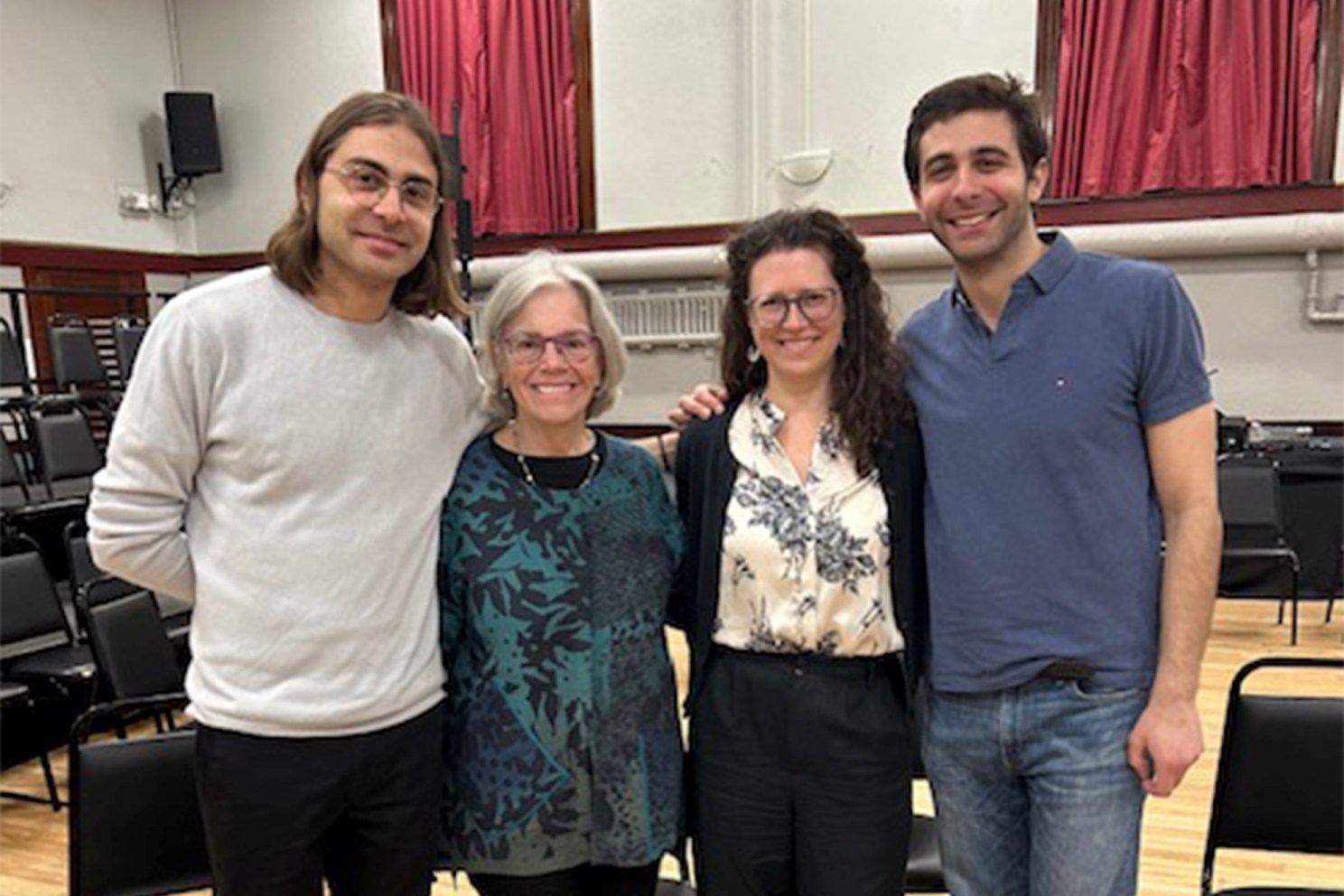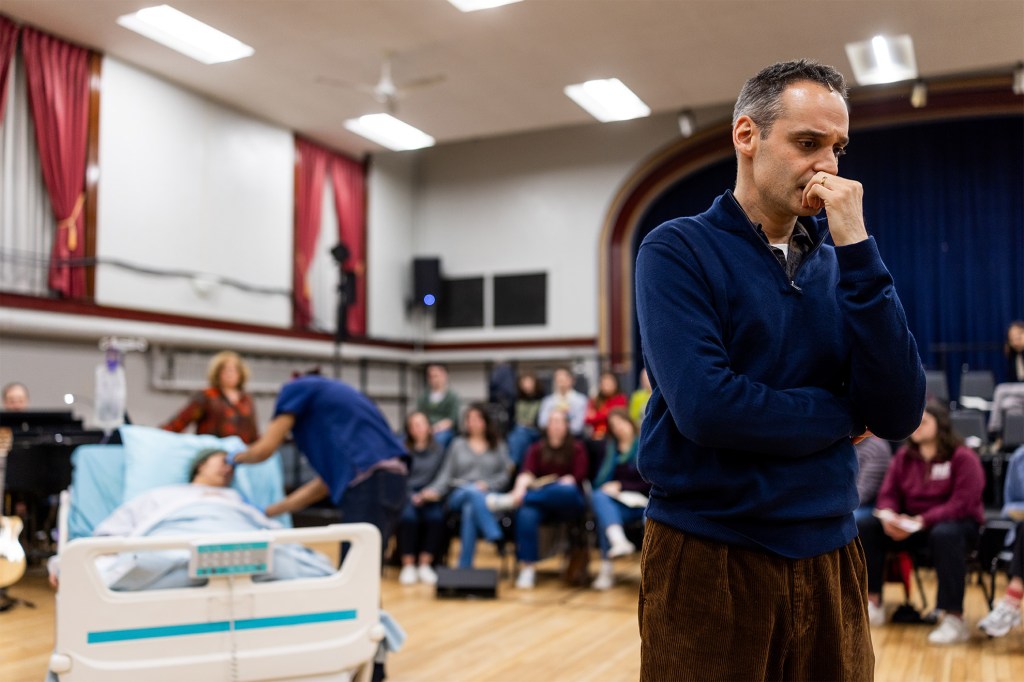
Conversations with palliative care specialist Susan Block (second from left) were instrumental to the development of “Night Side Songs” by Daniel Lazour and Patrick Lazour (far left and far right), seen here with Amanda Moment, a social worker from Dana-Farber and BWH.
Courtesy of Susan Block
‘Singin’ in the Rain’ this isn’t
But palliative care specialist who advised on ‘Night Side Songs’ says new musical about cancer patient is rich, moving
Susan Block, founding chair of the department of psychosocial oncology and palliative care at Dana-Farber Cancer Institute and Brigham and Women’s Hospital, has been seeing dying patients for more than three decades. She had trouble imagining how Daniel and Patrick Lazour, who approached her for advice, were going to be able to build a musical around her sobering area of specialty.
“I had some skepticism about the idea of a musical about death and dying,” said Block, who is also founding director of the Harvard Medical School Center for Palliative Care. “And I mean, I love any kind of theatrical performance. And I like musicals. But I just couldn’t quite juxtapose this.”
But, she said, her doubts dissipated after seeing the first run-through of “Night Side Songs.”
“There was a feeling by the end, that we had all been through something together,” Block said.
“When I was a medical student and an intern, I didn’t like the way people who were dying were treated in the hospital. I thought that they were infantilized …”
Susan Block
“Night Side Songs,” inspired by writer and cultural critic Susan Sontag’s observation that “illness is the night side of life,” is told through the voices of doctors, patients, researchers, and caregivers. It was commissioned by Harvard’s American Repertory Theater and is being staged at the Cambridge Masonic Temple through Sunday and Hibernian Hall in Roxbury April 9-20.
The story revolves around Yasmine, a young cancer patient played by Brooke Ishibashi. The Lazour brothers conducted years of research into end-of-life care and experiences, and they asked Block to review drafts and attend read-throughs to give notes on accuracy.
“I felt that they captured essential elements of the experience from the point of view of patients, of caregivers, of other family members going through it, and of the clinicians in a really very emotionally evocative, intense, beautiful way,” said Block, who has seen the show multiple times since its inception.
Block went to medical school in the late 1970s and early 1980s. She said back then there was no such thing as palliative care. She has been a pioneer in studying the psychology of dying and getting palliative care into hospitals across the country. Now, a musical is inviting people to think and speak candidly about the end of life.
“When I was a medical student and an intern, I didn’t like the way people who were dying were treated in the hospital,” she said. “I thought that they were infantilized in ways — that was a period where people weren’t told the truth about their illness, where pain was not well treated, where there was not good recognition of people’s emotional suffering about and grief about the idea of leaving, that families were kind of left to figure it out on their own.”
Since then, palliative care has become a recognized area of specialization involving thousands of doctors across the country. Still, Block said, we don’t talk enough about death and dying.
“I think giving people the opportunity to speak about this lets people play around with it, because most of us do a lot of our deeper understanding and processing by talking with somebody else in community,” she said. “And for people who are seriously ill and dying, there’s this feeling that if I tell my wife how upset I am about my illness, it’s going to make her sad and make things worse for her. And then the wife is saying, ‘Well, I want to protect my husband from knowing how sad I am.’ There’s this conspiracy of silence about it, and it also creates enormous isolation for both people.”

Jonathan Raviv in A.R.T.’s world premiere production of “Night Side Songs.”
Credit: Nile Scott Studios
Notably, “Night Side Songs” is not being performed at the A.R.T.’s Loeb Theater, which accommodates audiences more than twice the size of either Masonic Temple or Hibernian Hall. Both venues also allow for theater in the round, with audience members seated in a circle around the performers.
According to A.R.T. Artistic Director Diane Paulus, the show is being performed in these more intimate venues to inspire audiences to connect with both the actors and each other.
“Getting out of the proscenium arch, the strict auditorium, breaking that into a circle, reducing the audience to make it intimate, and audience size really matters,” she said. “And our mission is to expand the boundaries of theater. So we are always looking for shows like ‘Night Side Songs’ that are pushing the boundaries of what we think the form of theater is.”
The other unifying element, Paulus said, is the invitation for the audience to sing along.
“The way they do it is so inviting and graceful. And you can sing along, and you can listen … It’s really an invitation for the audience to experience the material in a very deep way,” she said.
Block says “Night Side Songs” will resonate with anyone who’s been touched by serious illness.
“When you’re sick, you want to believe that science and medicine know what to do, and everything is going to work out OK,” she said. “But then unexpected things happen, and I thought that the play dealt with the uncertainty and expectation of unexpected outcomes in a very real, very poignant way.”
More information about the show and tickets can be found on the A.R.T.’s website.




